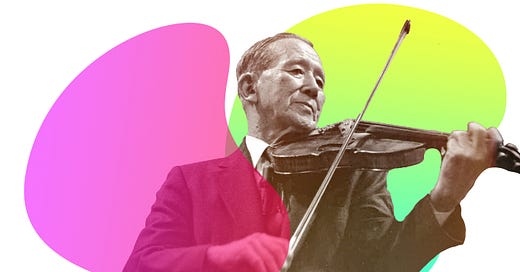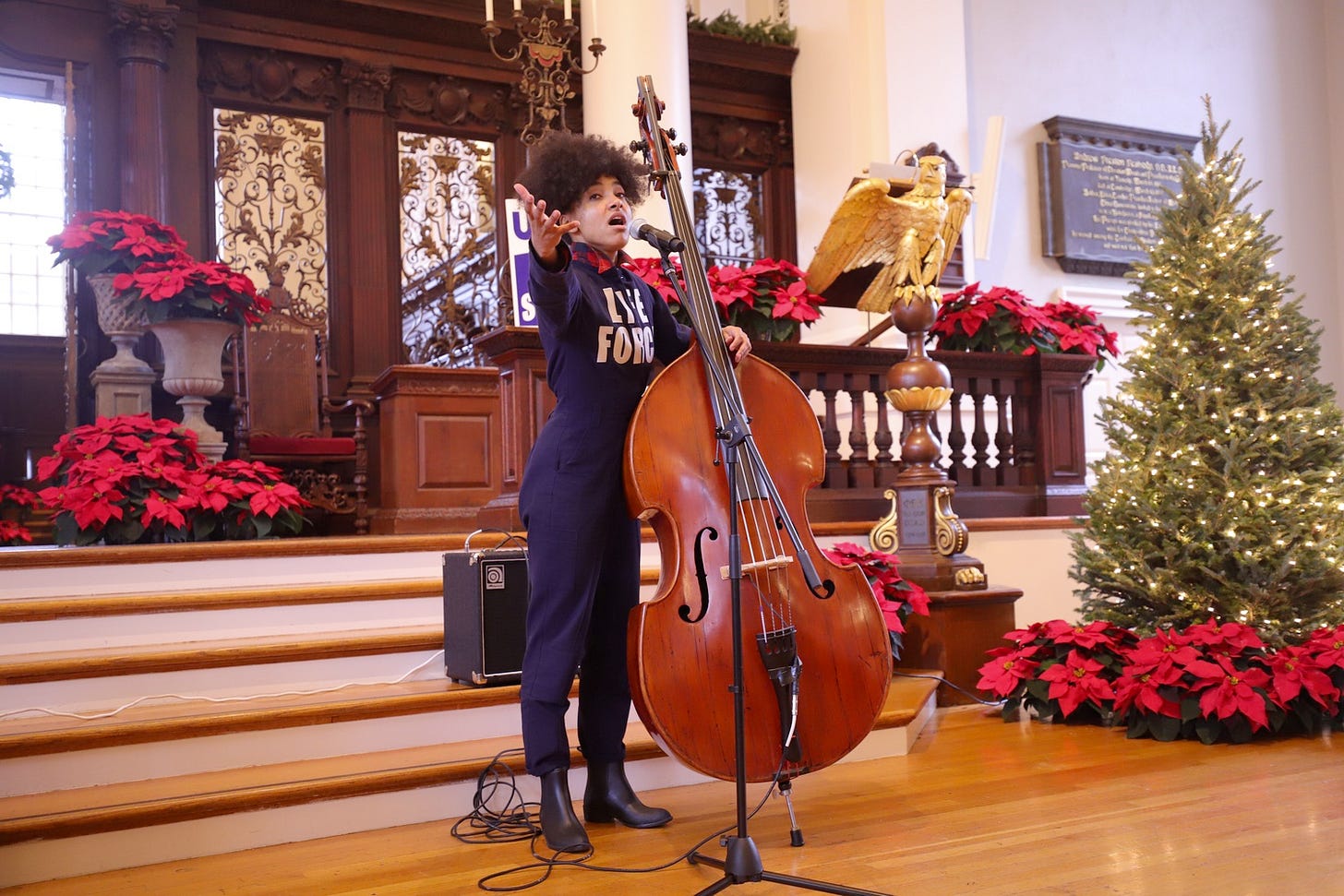The Deep End
4 A’s worth sharing this week: what the Suzuki method really taught, Esperanza Spalding leaves Harvard, Nate Chinen enters the chat re:jazz standards, new music, and more…
Here are four things (A’s) we thought were worth sharing this week:
A1. What the Suzuki Method really taught.
The Suzuki Method, familiar to the vast majority of string students in the Western musical tradition, has been the dominant mode of instruction in the United States since around the early 1960s. The central tenet of the method, based on language acquisition theories, is that all people can (and will) learn from their environment.
Though, as it turns out, there’s a lot more to the underpinning philosophy…
In the new book Suzuki: The Man and His Dream to Teach the Children of the World (Harvard) the Tokyo-born historian Eri Hotta takes on the life story of the man who made the mini-masters. In an article published this past week the New Yorker explored how the reduction of Suzuki “to a system of music instruction misses its underlying point about human potential.”
As often happens with books pointing to big questions, the most interesting stuff points back at smaller or, anyway, more particular ones. The Suzuki story turns out to be a fascinating study in the hybrid nature of human culture, tracing a remarkable cross-century triple play—European music to Japanese discipline, ending with a putout at a first base manned by mad American parental ambition.
What matters most is not making music but finding meaning in music. A crucial clue to Suzuki’s story here is seeded by his biographer, even if it is easy to miss. Hotta tells us that Suzuki credited his eureka moment, listening to the Elman recording of Schubert, to his having been exposed, not long before, to Tolstoy’s diaries. One form of emotional growth activated another. The range with which we extend our experience of music horizontally may help explain its extraordinary vertical depth.
The more connections we make to music, the more significance music has. What we do know is that early exposure to art and music gives kids a longer familiarity with art and music. The sooner you start, the more you sense. It’s a self-evident truth, but self-evident truths can be, for children and countries alike, essential to independence. The parents and nonparents may worry loudly about what the kids sawing away up on the platform are doing and where it will get them, but the kids don’t hear them. They’re making music.
Read more at the New Yorker.
A2. Bassist & composer, Esperanza Spalding departs Harvard.
After being appointed a professor of practice in 2017, bassist, singer, composer, and opera librettist Esperanza Spalding wrote in the email that “she has communicated with Harvard over ‘many months’ about a proposal for a decolonial education curriculum she would like to implement as a course or initiative,” but said what she aspires to cultivate and activate in organized learning spaces is “not (yet) aligned with Harvard’s priorities.”
Her departure comes after multiple conversations with University officials about implementing her “Black Artist-Educators Decolonizing and Placemaking (BAEDAP)” model, which she envisioned as either a course or initiative. BAEDAP “works to devolve portions of colonial institutions’ holdings, and through doing so, help heal their impact-on, and relationships to, communities of color.” Under the BAEDAP model, Harvard would “rematriate” some of its land and buildings, offering them as spaces where “Black and Native artists, scholars, students, activists, and cultural workers,” as well as the broader Harvard and surrounding community, could collaborate and make art. — Harvard Magazine
A3. Standard deviation.
Jazz critic Nate Chinen recently weighed-in on the new strategies being taken by Terri Lyne Carrington, Shai Maestro, and others (that we wrote about here and here, and talked about on the podcast here and here) to bring more equity to jazz songbooks and learn standards more deeply, respectively.
He calls Maestro’s approach to playing standards, “extreme,” while acknowledging that “it touches on an idea or two that I’ve heard again and again from the masters.”
When Sonny Rollins talks about the old songs, he often refers to the lyrics. Lee Konitz used to go so far as to sing them. Earlier this year, when I spoke with John Scofield about his first-ever solo album, he recited most of “It Could Happen to You,” as a way of understanding the tune.
On Terry Lyne Carrington’s New Standards project he wrote:
When we talk about standards, we should remember all the connotations of that word. One of the most significant jazz stories of 2022 is the realization of Terri Lyne Carrington’s New Standards: 101 Lead Sheets by Women Composers—a principled corrective to the canon, and a slab of compositions that’s now likely to circulate more widely. Last Tuesday, the day before I caught Tigran in Ardmore, TLC earned a Grammy nomination for a companion album, New Standards, Vol. 1. Carrington seems to have taken a page from one of her forebears, Max Roach, in tackling the issue of women’s marginalization in jazz culture; her core strategy is Deeds, Not Words.
You can read more of Chinen’s thoughts on his substack, The Gig.
A4. New music this week from Isaac Romagosa, Cautious Clay, and Weyes Blood.
From Now On is the debut EP of guitarist and composer (and friend of Foray) Isaac Romagosa. Romagosa explores his Catalonian heritage through his integration of flamenco rhythms, Messiaen-like melodies, and jazz harmony. It includes personnel from Spain to Cuba to America.
The new EP from Brooklyn-based artist, producer/songwriter Cautious Clay, Thin Ice on the Cake, “toys with the meta surrealism of life and death found in birthdays, and the power of accepting the things we cannot control in life.”
Conceptually Thin Ice on the Cake relates to being on the edge of something really bad as we grow nearer to death, but birthdays are also about celebrating the positives and joys of life. The cake is a great symbol of that. — Northern Transmission
New music from the American singer-songwriter Natalie Mering’s Weyes Blood project. Pitchfork gave the album, And in the Darkness, Hearts Aglow, a strong 8.4 saying Mering’s “majestic fifth record is a dispatch from the center of catastrophe—an idiosyncratic set of love songs and secular hymns with lushly orchestral arrangements.” The Guardian called her “preternaturally wonderful” voice a 21st-century take on the “Laurel Canyon folk-pop idiom of the 1960s; both an awe-striking thing of beauty and a comforting balm.”
Thanks for reading! We hope you’re enjoying this format as much as we are, but as always if you have ideas about how we can make it better, please hit us up. As the saying goes, “this newsletter is free, but it’s not cheap.” The best way to support Foray Music is to share the link on social media and become a subscriber (or snag a hoodie!).
We think you’re super,
Charlie + Alexandria
Extra credit: The deep end.
Have you checked out our podcast yet? It’s streaming everywhere, including Apple Podcasts, Spotify, and Overcast. 😎









